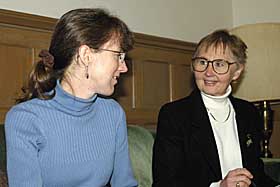|
This is an archived article.
For the latest news, go to the
Advance Homepage
For more archives, go to the Advance Archive/Search Page. | ||
|
'Faculty Learning Communities' The students started trickling in about noon. By 12:15, a dozen had arrived, and class was ready to begin. Soon, it was in full swing. It was a good class, with everyone participating, raising questions, offering each other suggestions, and occasionally laughing. The instructors pitched in when necessary.
The students in this class were freshmen. Not in the traditional sense, but freshman faculty, men and women who this semester are standing in front of a UConn class for the first time. "Several of the newcomers are new to the University but not to teaching," says Keith Barker, associate vice provost for academic affairs, director of the Institute for Teaching and Learning, and organizer of the Faculty Learning Communities. "They're primarily young people." Barker says the program is voluntary. "But because they're in the same cohort - they're all new teachers - and they're sticking with it, I think they're finding it valuable." Eric Rice, a visiting assistant professor of music history, says he certainly does. "It's good to be in a situation where you're talking with other new faculty and getting their reaction to the kind of things you're doing," he says. "There are a lot of things we deal with as new professors that we'll probably deal with our entire career. I'm not sure you ever feel entirely comfortable," Rice says. For precisely that reason, Barker says, the Institute for Teaching and Learning also offers a Faculty Learning Community focused on using technology in the classroom, and a popular lunch-time seminar series that began several years ago and touches on a range of topics useful to all faculty, from basic web design to time management to teaching students effective study skills. The learning communities began last year on a trial basis. The classes filled quickly and were well received. When the Early Retirement Incentive Plan was implemented earlier this year, Barker knew the fall semester would bring another influx of new faculty, and he and his staff began scheduling more learning communities. Barker is pleased with the way they are going. With a different workshop offered roughly every other week, Barker says he's seeing more than half of the about 35 faculty who began working at UConn in September. As for new faculty who are not taking advantage of the programs, which run from 12:15-1:45 p.m. on alternate Mondays, "They're missing out," Barker says, "not only on the experience of learning from others, but also on the collegiality, getting to know people they can say hello to when they meet on campus." Barker says all new faculty, as well as their deans and department heads, are invited to social events during the semester, where they can discuss classes, their students, the University, or even the latest Husky game. Other faculty are welcome to attend either of the last two meetings of the semester, scheduled for November 10 (how to create an effective syllabus) and November 17 (building a portfolio), or to sign up next semester for a new series of meetings. In classes held so far this year, the group has discussed the importance of creating learning objectives, laying down ground rules in class, clearly communicating goals, and teaching in large classes. The latter discussion also included tips on how to build a relationship with a class and earn students' respect. A recent session focused on how to assess student achievement. For each class, Barker brings a guest who has expertise in the field to be discussed, then he and Jill Thorne, a colleague in the Instructional Design and Faculty Development Group, also offer a few words. The presentations last only a few minutes, leaving the bulk of each class for the participants to ask questions, express concerns, and receive input and advice from their colleagues. The "students" do most of the talking. People attending the Faculty Learning Community meetings also receive a free lunch, thanks to an endowment fund established by Professor Dorothy C. Goodwin, a former legislator and local teacher, with a $10,000 gift dedicated to faculty development. The donation also allowed Barker to buy and distribute books on pedagogy to the faculty who sign up for the sessions, and has paid for some conferences. During a recent session, Rice, the music history professor, expressed concern that the mid-term exam he set his students recently was too hard. The papers he had corrected to that point were not up to the standards he had hoped for. He wondered if he might be contributing to the weak papers. His colleagues didn't think so. For 15 minutes they discussed the issue from a variety of angles, suggesting strategies to help the students before tests and methods to ascertain whether the students were ready for a challenging test, and offering Rice support for being tough. "I believe in challenging exams," said Wes Younts, who recently joined the sociology department. "Nobody should get 100 percent, and I explain that to my class right at the start. Nobody is going to do everything perfectly, but they will be better tomorrow than they were today, and better next week than the previous week." By the Tuesday session, his prediction had come true. After grading more exams, Rice was decidedly more upbeat. "I just hit a whole patch of much better exams," he said, "and a number of the students have come to me since yesterday, and said the test was challenging but fair. So I think some of my fears have been alleviated." |

